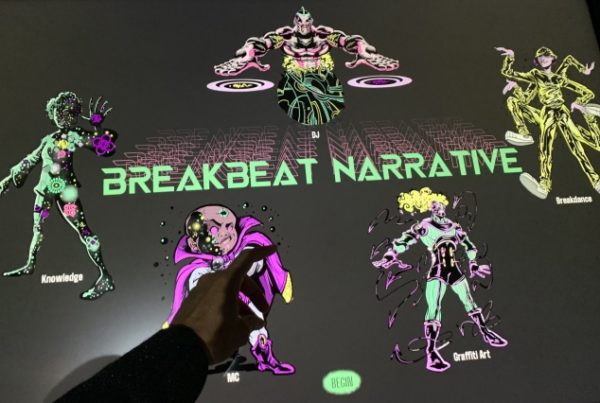2012

Abstract
Online social networks and video games are prevalent in today’s society, and using both video game characters and social networking profiles cam potentially be used to help people better understand others’ experiences, delivering meaningful experiences which enable critical reflection upon one’s identity, and on others’ experiences related to identity.
However, merely customizing graphical representations and text fields are insufficient to convey the richness of our real world identities. As a step towards conveying richer identity experiences, we introduce our interactive narrative game called Mimesis, which aims to allow players to explore identity phenomena associated with discrimination.
The story of Mimesis takes place in an underwater setting with subtly anthropomorphized sea creatures as characters. The player character is a mimic octopus, which is a species of octopus adept at emulating other creatures. The octopus is on a journey that takes it from the dark depths of the ocean to its home in the tropical shallows. Along her way, the octopus will encounter several sea creatures who inhabit the waters and whose actions serve as examples of particular kinds of covert discrimination. These sea creatures provoke the octopus, leaving the player to must choose between different emotional responses to the creatures in order to guide the octopus through a series of short conversations. In this way, the project maps the experience of discrimination onto gameworld based on an underwater metaphor.
PUBLICATIONS & PRESENTATIONS
D. Fox Harrell, Chong-U Lim, Sonny Sidhu “Exploring Social Discrimination through Interactive Narrative using Mimesis”, New Media Consortium Summer Conference, 2012
D. Fox Harrell, Chong-U Lim, Sonny Sidhu, Jia Zhang, Ayse Gursoy, Christine Yu “Exploring Everyday Creative Responses to Social Discrimination with the Mimesis System”, International Conference on Computational Creativity, 2012
D. Fox Harrell, Chong-U Lim, Sonny Sidhu, Christine Yu, Jia Zhang, Ayse Gursoy , “Mimesis : An Integrated Social Networking Application and Computer Game for Exploring Social Discrimination” Electrifying Literature: Affordances and Constraints, Electronic Literature Organization
REFERENCES
Goffman, Erving. Stigma: Notes on the Management of Spoiled Identity. New York: Simon and Schuster, 1963. Print.
Harrell, D. Fox. “Computational and Cognitive Infrastructures of Stigma: Empowering Identity in Social Computing and Gaming.” Proceedings of the seventh ACM conference on Creativity and cognition, Berkeley, CA, 2009. New York: ACM, 2009. Web.
Harrell, D. Fox. “Designing Empowering and Critical Identities in Social Computing and Gaming.” CoDesign International Journal of CoCreation in Design and the Arts 6.4 (2010). Web.
Harrell, D. Fox. “Towards a Theory of Critical Computing: The Case of Social Identity Representation in Digital Media Applications.” CTheory, May 2010. Web.
Harrell, D. Fox. “Toward a Theory of Phantasmal Media: An Imaginative Cognition- and Computation-Based Approach to Digital Media.” CTheory, Sept. 2009. Web.
Harrell, D. Fox. “Steps Toward the AIR Toolkit: An Approach to Modeling Social Identity Phenomena in Computational Media.” Paper presented at the 2nd International Conference on Computational Creativity, 27-29 April, Mexico City (2011).
Linde, Charlotte. Life Stories: The Creation of Coherence. Oxford, U.K.: Oxford University Press, 1993. Print.
Lakoff, George. Women, Fire, and Dangerous Things. Chicago: University of Chicago Press, 1987. Print.
Santa Ana, Otto. Brown Tide Rising: Metaphors of Latinos in Contemporary American Public Discourse. Austin, TX: Univ of Texas Press, 2002. Print.
Sue, Derald Wing, Christina M. Capodilupo, Gina C. Torino, Jennifer M. Bucceri, Aisha M. B. Holder, Kevin L. Nadal, Marta Esquilin. “Racial Microaggressions in Everyday Life.” American Psychologist 62 (2007), 271-286. PubMed. Web.




